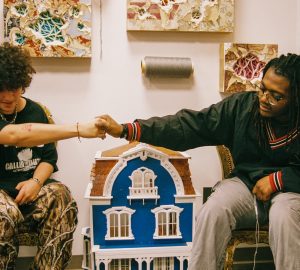by Adreon Petterson
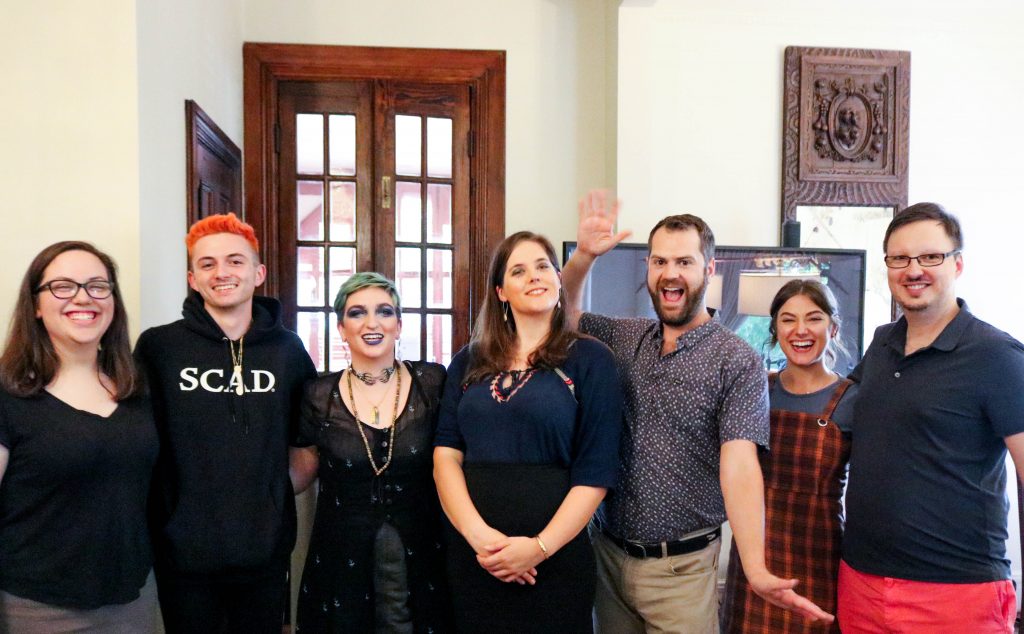
After battling typical Wednesday traffic, I arrived at Ivy Hall to find the only parking space available was against the bushes along the rocky driveway. I made my trek to the writer’s sanctuary as the driveway morphed into the gravel circle. I walked through the side door as my classmate greeted me mid-conversation on her phone. After a hot car ride, Ivy Hall’s air conditioning was a nice reprieve from the Atlanta heat. I sat at the round dining room table and prepared myself for an evening of readings from both SCAD students and alumni.
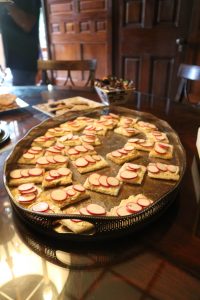
Things got rolling as the round wooden table became dominated by an assortment of treats — cookies, candy and a special treat made by alumni Atelier Matt Terrell. Terrell’s mix of radish, butter and baker’s bread left a refreshing taste on my palette. After some snacking, swarms of hungry students ascended upon the dining room signaled that it was time to travel upstairs and get ready for a cavalcade of readings.
After taking my seat, I got my notebook ready while other students filled in the wooden chairs and other available seating. Soon, Ivy Hall Review’s graduate editor Lila Dostal greeted the audience with poise and grace as she ran through the evening’s reading selections.
After the introduction, she called up second-year writing student Marian Hill, who read two selections, the first for first-year writing student Jack Young and the second for fourth-year writing student Logan Hughes — both unable to read that evening.
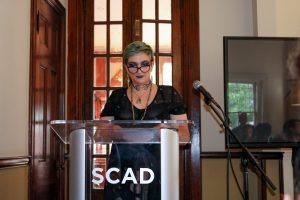
Both selections were takes on Dominican-American novelist and writer Junot Diaz’s piece, “How to Date a Brown Girl.” The first selection was Young’s “How to Be a Modern Mary Magdalene.” Young’s words spoke of trying to live one’s life in the modern age of social media and casual sex. The piece morphed as Hill read from trivial to deeply personal to religious redemption with the line “Try to recall the last time you were happy.”
The second selection was “It Was You, Right” by Hughes. In Hughes’s piece, there was the illustration of the turbulent emotions that came with on-again, off-again relationships. A pivotal point came when Hill read Hughes’s most vulnerable part in the piece, as he missed his lover’s face and apologized for a fling.
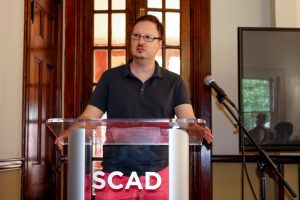
After such lyrical pieces, the mood shifted as Dostal introduced graduate writing student Russell Cambron to read an excerpt of his piece, “Waxing Full.” Cambron explained the genesis of the piece as his ordinary day of shopping turned into confronting a bullying issue his brother-in-law was dealing with. He punctuated the sentiment with “adults won’t help,” as everyone from administrators to faculty will ignore the bully and their barbaric ways. His description of Burger King, where the conversation took place, was very vivid and detailed as he painted the scene with his words. As Cambron thought about his previous thesis show as an MFA photography student, he connected the young boy’s adolescent hardships as an incident of art imitating life. This moment was punctuated by Cambron referencing the boy’s decisions informing his character as he comes of age with the quote “question of how you handle everything.”
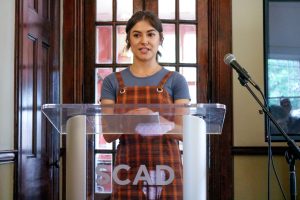
After a very moving piece, things lit up as Cambron introduced fourth-year writing student, Rachael Needham before leaving the podium. Needham’s nervous energy gave way to quiet confidence as she introduced her piece, “All About Umami,” from Terrell’s forthcoming cookbook “Magnolia Bayou.” She spoke on food being both a cultural exchange and a form of art before reading her selection. In her piece, she spoke of Umami’s ability to “spread across the palette” compared to other taste sensations like salty and savory. A combination of enhancers led to what Needham described a “flavor bomb,” along with being “deliciously complex.”
After Needham’s savory reading, Terrell took his place at the podium and spoke about his forthcoming cookbook. He spoke about his upbringing in a diverse town like Magnolia Bayou, which he referred to as the “Singapore of the South.” He mentioned his book featuring modern recipes with herbs and spices rather than the usual Southern staples — fat, salt and butter.
He said, “The labor of cooking results in the taste of love. You can’t semi-homemake that.”
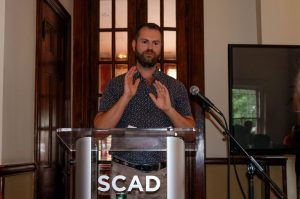
His best quotes came from his character, Daryl, a gay military veteran. He spouted such gems as, “You haven’t seen anything, honey, until you’ve run out of bacon and you still have 1,500 men to feed” and “If you can get a queen and a bear to dine off the same plate, you’ve done your job.”
The event concluded on that funny note as Terrell relinquished his spot at the podium for Dostal. She closed out the reading with some parting words, as well as a reminder to any and every student to participate in the Ivy Hall Review.




